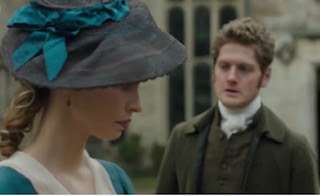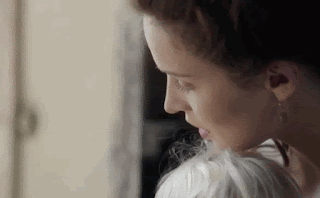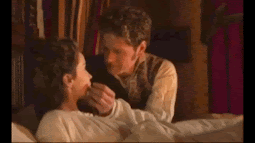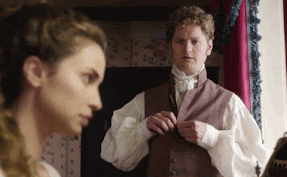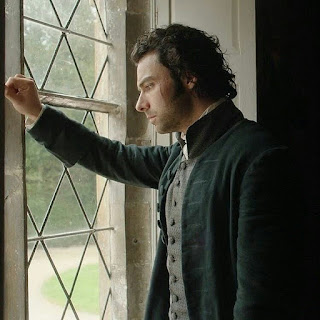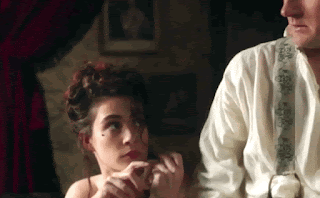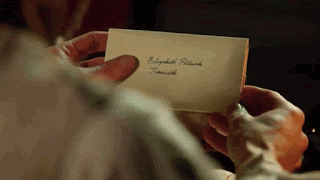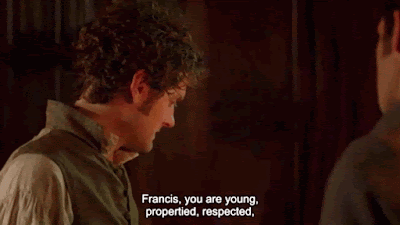
'They were all sentimentalists at heart, the Poldarks, Verity thought.....Francis Too. Half his ailments came from the same source. He expected too much of life, of Elizabeth. Especially of Elizabeth. When they failed him he resorted to gambling and to drink.'
'Demelza' (Book2 chapter 6)
The plight of Elizabeth Poldark as the woman Francis married, who then fell out of love with him and was also disappointed by him, is often fully embraced. However, is it truly and fully embraced that it was Francis who was first disappointed in her and then lost his way with disappointment?
It is quite possible that of the key characters in Poldark that Francis Poldark is the most easily misunderstood one and one whose struggles as well as successes could be too readily dismissed. Essentially this post seeks to explore how this is the case. In short, at the root of this issue is that there is not only an untold story of Francis Poldark but there is also a rewritten one that readers and watchers of the story, as told originally in the books and also in a revised manner through adaptions, are presented with. Naturally these strike at the heart of understanding Francis Poldark, or rather the misunderstanding of him. This post will look at Francis's untold story from the books and the follow up post 'The Rewritten Story of Francis Poldark' will look at how it was subtly rewritten in both adaptions for television in order to build a much more pathetic character profile than the Francis Poldark of the original story.
Collateral Damage for Ross and Elizabeth's Unfinished Business
Francis’s short tenure in the story lasting just three and half books out of twelve is a factor with regards to his untold story. However the main reason for any overlooking of his story is most likely because whilst he was a key character he was essentially a supporting one to aid the central and more overshadowing plot concerning another character. Francis served the main plot by being the obstacle that put Elizabeth out of Ross's reach to begin the story and to provide the initial plot tension.This plot obstacle was so that Ross in this first instance would be deprived of the woman he then loved, find a truer and more real love elsewhere with Demelza and then once Francis was removed by death, this plot development would see Ross drawn into infidelity with the then widowed Elizabeth. It was a plot that Winston Graham's son said his father had commented could be written on the back of a postcard. Indeed Winston Graham did explain during a print interview for Daily World from Opelousas in 1978 that "once he (Ross) had her (Elizabeth) he (Ross) discovered it was his wife he really loved." So this only reinforces that after all that, Francis had just been collateral damage for a frustrated unfulfilled love story between Ross and Elizabeth that still never materialised and prospered to a real and viable one, even after Francis's removal. Also in respect of Francis, this plot was one that was not necessarily concerned with telling his story. Francis's story. Therefore there really was no explicit breaking down and emphasising of 'his journey' and because of this it often means it remains one that lies in the shadows. Francis’s Story In The Backseat
As a supporting character, together with his financial demise one of Francis's main storylines was the break down of his marriage to Elizabeth. In fact this really was his central story line as many things flowed from this that contributed to his downfall but also led to his next key storyline which was his easily side lined redemption story. The marital breakdown and the impact on him will be a focus here as there was a lot of pain in this story line for him. It is this that might be dismissed or treated lightly but still nevertheless was the heart of his downfall. To understand this pain more is to understand Francis's character more. And although it is a story which is key for him and was a sub plot in the whole story, the reader is not really given the detailed inside story on the marriage in a way that doesn't require a more than casual attention to detail and examination of it.
A Sweeping Time Span. A Swept Story?
Francis's marriage break down started around after a year of marriage and spiralled for the next three years with the time span of the first book covering that four year period. Despite this, aside from the finer aspects of their marital difficulty even the bullet points of it from Francis's perspective can get lost in the fast sweeping nature of the story telling in this first book. This instead focuses on Ross's story and his transformation from a lonely rejected man to a happily married one. With Demelza being his ‘saving grace’ but entering the story at just thirteen years old the sweeping time span is also on account of documenting Demelza's transformation and quickly bringing her to the age of seventeen where she could therefore marry Ross. Apart from Elizabeth having a story where she appeared to be resuming an interest in Ross and enticing him to renew his interest in her, all these themes appeared to be the priority rather than the documenting of the transformation and intricacies in the marriage of Francis and Elizabeth.
Jumping The Marriage Story
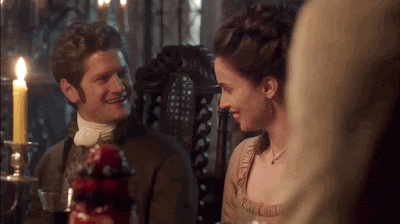
It is at the one year point into the story that readers are invited to see an argument between Francis and Elizabeth after Geoffrey Charles's christening and this is then the last scene for them before the story jumps three years ahead and opens with passages which introduce a much grown and blossomed Demelza. Then as documented in the previous post 'Reaching Out For Ross' Elizabeth turns up at Nampara now four years married and seeking a SOS with her marriage issues and something romantic from Ross too. So the reader has not then been invited to see the nitty gritty and truly understand how the slow decimation of the Francis and Elizabeth marriage occurred over those three years. Whilst this is understandable since this was not the main plot, it does mean that 'Francis's story' here is muted by having taken this back seat. But also there is another issue that means that there is essentially a slight 'un-telling' of Francis's story too. This, as referred to below is due to variations between the first full editions of the early books in the saga (which are no longer on sale and hard to acquire) as against the current editions on sale now. The Missing Words, The Missing Understanding- The New Book Editions
'He lay with hands behind his head and eyes open for an hour or more before he went to sleep. He was consumed with disappointment and jealousy.'
Francis - (Ross Poldark Book one/Chapter twenty one) First Edition text
In fact, though the television adaption created new scenes, in the four year period of the first book there were barely any scenes in the book which included Francis and Elizabeth alone together in dialogue after they were married. This is except for one of great importance already mentioned just above after Geoffrey Charles's christening where they fell into an argument. In the full edition of 'Ross Poldark' Graham shared just beforehand that at this point in her life with Francis Elizabeth had the feeling that 'life is good' with Francis. Also with Elizabeth later reinforcing in the full edition of the next book 'Demelza' that she had thought this day to have been 'the peak of her happiness' in their life together, this argument then gave some additional understanding to the beginning of their marital issues and why thing went downhill from there on. Whilst in Elizabeth's mind life was good for her, this had not been the case with her husband for some time before.
That Christening Day Argument- The Lonely Husband Is Revealed
'In the instant of his birth her existence changed,...she had seized upon a life-long commission of motherhood, a proud and all absorbing task beside which ordinary duties became void.'
'Ross Poldark' - Book 1 -chapter 21
The very revealing and key argument scene in the Francis and Elizabeth marriage story, as set out in 'Ross Poldark' was only retained partially from the first full edition to the current edition. It was before Francis's gambling became a worry to Elizabeth and spiralled out of control. It was also before he started seeing a prostitute. Life was good and Elizabeth had thought to herself that '..she and Francis had lived an extravagant care-free life..' The change was the birth of Geoffrey Charles.
This scene in the current edition of this first book is heavily edited against the full version. Therefore the full narration and all the dialogue in the argument is not available to readers of the current edition. The fuller edition includes more of their private thoughts and also in respect of Francis there is crucial narrative whereby Graham wrote that when joining Elizabeth later that night 'He forgot his loneliness, her unapproachableness through preoccupation with Geoffrey Charles.' Along with Graham's reference in this full edition of Francis being full of love for his wife that evening and having eyes for no one else, this line now powerfully invites a greater awareness that this was also a man who had been facing some rejection by his wife for some time and to the point of feeling lonely. It is a direct contrast that after Julia was born and Ross had been speaking with Demelza about arrangements for her christening Graham wrote that 'They walked arm in arm, and he thought how quickly they had refound their old companionship.' A tale of two marriages!
In this scene of the first/full edition Graham also referred to Francis taking Elizabeth into his arms and embracing her with love and affection and that despite this 'She found herself pushing him gently away...he smiled and took her in his arms again. She was lifeless. He released her.' As Francis reflected on his months of restraint and suggested that he had not been ungenerous or short of sympathy towards her Elizabeth's comment to him
"I cannot understand you. It is not like you to be so unkind.", seem to verify Francis kindness in the time beforehand was a matter of course as well as her own lack of understanding and empathy in how her lifeless response to his affection might have hurt him.
As this passage in this edition of 'Ross Poldark' went on to reference Francis's struggle with his feelings along with his disappointment and desolation it therefore provides the additional shades to the greys in 'Francis's story'. It allows for just that greater understanding of Francis's point of view and his experience before he went astray from the marriage and fell to vices in order to comfort (or distract) him. Without these shared words some of his crucial story is untold and his pain unheard or edited out.
The Missing Story of Elizabeth's Ivory Tower.
'Her aloofness-which he had helped to create-as always irritated him. He could not reach her in her ivory tower of poised unspotted delicacy.'
'Demelza' Chapter 6 - First edition
Apart from the lack of focus and detail of Francis and Elizabeth's marital breakdown in the first book, it was Graham's choice thereafter to give only passing narrative references as to the real, (rather than assumed) reason that it occurred. Graham did narrate in the first/full edition of the second book 'Demelza' that Francis had tried to connect with his wife but that he thought she sat out of his reach in a ivory tower. With the typical poise that Elizabeth's character is known for that is unsurprising. His complaint here was her 'aloofness'. Although Graham had also narrated that Francis had helped to create this.
In the nature of marital conflict and of these two opposing characters it's perhaps easy to appreciate that with Elizabeth's conservative and poised nature and her tendency to avoid confrontation Francis's more bolder and direct manner in trying to address disagreement would lead her to retreat even more so to a state of aloofness. This likely enhanced the 'unapproachableness' that Graham also described Francis feeling she exuded towards him. Of course whilst this would be in her attempt to shield or ward off tough conflict talk though this can often be painful it is this that often enables resolution. And yet it was not just with Francis that she did this to. Elizabeth had done the same thing earlier in the book with Ross.
An Angelic Aloofness Which Stirred A 'Black Desire' To Smash It
"It is all as you say, is it not? A Lovely wife, fair as an angel-indeed, perhaps more of an angel than a wife..."
Francis to Ross about Elizabeth 'Ross Poldark' -(Bk3 Chapter 8)
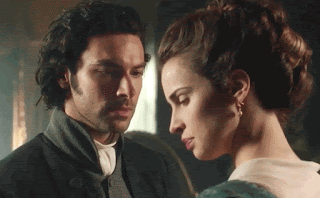
As suggested Elizabeth's 'aloofness' was a trait of hers which even Ross faced such as when she avoided giving him an explanation over why she did not wait for him to return from war. Her frustrating approach to conflict is well documented in the post 'Just A Boy And Girl Attachment'. Like Francis, Elizabeth's delicate poise and her composure generally evoked strong feelings of irritation in Ross too. Even violent! Graham wrote in 'Ross Poldark' that on seeing Elizabeth at Trenwith and bearing in mind their frostiness on account of their unfinished business, Ross observed her as a 'Beautiful and fragile and composed, a married woman. A black desire rose in him to smash the composure. He subdued it.' So Graham made it clear that Elizabeth’s composure bothered Ross too and Graham went further by stating that after their argument Ross actually felt a '...queer perverted pleasure which came from striking with his barbed tongue at her composure.' One can only imagine how Ross would have coped in marriage to her when dealing with her aloofness over the number of marital grievances that are bound to have occurred at various points in a long marriage and with too contrasting characters. But for Francis this was something he faced within his marriage as an ongoing everyday or regular behaviour. Aloofness and detachment was an essential character trait of Elizabeth's and which will be explored in an upcoming think piece 'Elizabeth: A Nice Woman Of Her Time?' But the analogy of Elizabeth as 'unspotted', 'poised' in her 'delicacy' but also of her distancing herself from Francis in the ivory tower does helps to explain Francis's earlier comment to Ross that to him she was '...more of an angel than a wife.' It was not the expression referring to a warm loving wife but one who was overly concerned to give the appearance of righteous demure perfection without doing the dirty and often open emotionally challenging work of making a marriage work and resolving conflict and unhappiness in the other.
The Case For The 'Good Wife' That Didn't Love Her Husband
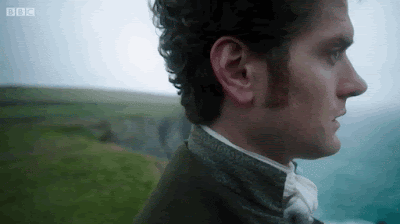
Typically in another removed book scene in 'Demelza', in the spirit of competition Elizabeth's response to Francis’s compliments of Demelza, was to debase Demelza as Ross's "little wife" and sing her own praises as a 'good wife' instead. This, perhaps almost as if she really were the angel perfect wife Francis had sardonically likened her too. This was in a scene now over five years into their marriage that is at chapter six of this first/full edition. Elizabeth angrily spoke of helping him and that no one could have done it better than her, caring for him, his child and house, waiting for him as he spent long nights gaming his inheritance away and trying to manage the household finances. The scene was a very revealing window into Elizabeth perspective as it highlighted what she considered to be a good wife that a man should be happy with. The focus for her was on the practical and duty side of marriage. But equally it also highlighted Francis’s reasonability as he acknowledged that 'All she said was true.' However it also validated his desolation at this point five plus years in as Graham wrote that despite this Francis's realisation (or rather Francis's own belief) was that whilst 'She had quite frequently obeyed him. She did not love him and she never had.' So in contrast to Elizabeth his focus and what was important to him was not the practical and duty side of marriage, but the emotional.
Ross: Doubting the Angel Wife Too?
Ross too fed this notion of an untold or hushed up story too. After Elizabeth was widowed and complained to Ross in 'Warleggan' about the poor state Francis had left his estate in for her, Graham wrote that 'It was on Ross's tongue to ask if she realized how much she had contributed to this state of affairs, but his tongue was tied.' In a sense Graham also kept a tight lip on this notion since the whole premise of this piece is that Elizabeth's contribution and the impact on Francis was clear but never made explicit. Despite this, this thought by Ross is a clear acknowledgement that Ross did not believe Elizabeth to be quite the perfect wife either and further that this had had a detrimental impact on Francis.
The First Breach. The First Blame
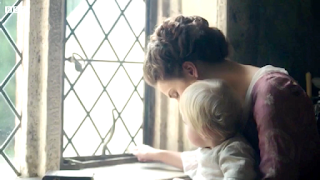
In documenting Francis’s marital struggles there is also another scene only in the first edition of the second book 'Demelza' which seemed to highlight the tension caused between them by Elizabeth's stifling parenting of Geoffrey Charles and her constant fear any illness he might have meant he had a serious infection of some kind. This against Francis's more easy going relaxed style. The irritation they both had towards each other in these passages and which are not in the current edition of this book validate later points made in later books narrated by Graham. These narratives clarifications by Graham may then have come too late in the story to make the full understanding of Francis's story linear and in real time reading rather than in thought retrospectively. For instance, it was not until six books later after this marriage breakdown that in 'The Angry Tide' Graham in retrospect casually narrated that Elizabeth's '..obsessive love for Geoffrey Charles had produced the first breach between herself and Francis long ago.'
The term 'obsessive love' only then informs the reader that actually Francis may not have been unreasonable to resent what was the usual delight and preoccupation a new mother would feel for her first child, but that this was something quite different and Francis's feelings of detachment from Elizabeth were indeed a fair complaint. Again this notion was reinforced in the later books where several references from a range of characters expressed surprise that Geoffrey Charles was by then a well adjusted man in light of how his Elizabeth had spoiled him. (This was most likely on account of his maturing time in the army.)
Although it does take two to tango and two to make a marriage work Francis can be thought of as bearing the sole responsibility for his marriage troubles because of the overtly scandalous and reckless way in which he responded to them. But also by virtue of that bad but reactive behaviour of his superseding his just complaint and then affording him the blame for it all, as he were the initiator in the first instance. Graham's narrative as to the 'first breach' in their marriage suggests quite clearly otherwise. The astute reader would also have picked up on the signs of the the bar Geoffrey Charles presented by Elizabeth. Perhaps to a father trying to get into the ivory tower. For instance, when on her visit to see Ross at Nampara her letting slip that she had refused Francis's request for her and Geoffrey Charles to travel with him to London on account of him being too young at aged three. Though in comparison Henry Poldark had later travelled with his parents to Paris at the same age. With Francis's story largely untold there would probably be many other similar instances where Geoffrey Charles was put forward by Elizabeth as a barrier to marital togetherness where for other couples it might have actually fostered this. A Reason To Sympathise With Francis?
'If refinement of taste is enough, then our married life has been an idyll, Francis had said on that long night in Bodmin. Refinement of taste? Was that all this woman had to offer?'
Thoughts of Dwight Enys in 'Jeremy Poldark' (Bk2 Chapter 2)
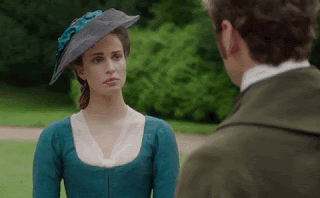
Though this post is dealing with Francis’s story the posts ‘Did Elizabeth Ever Love Francis Poldark?’ and 'The Real Love Triangle, The Powerful Rival' both address Elizabeth's love or lack of love for Francis. They generally conclude that whilst she certainly married him believing herself to be in love with him, that any love she did have fizzled out not due to any love for Ross but after a year around when Geoffrey Charles was born and because of this. Therefore this is yet another issue serving only to validate Francis's belief and his desolation in the experience of marriage to Elizabeth both before he went astray and even thereafter as a symptom of a pain caused by her to him. At least in the first instance. These additional bits of narrative from the first/full editions of the early books allow for a justified sympathy for a man living a marriage with a woman who not only did not love him, but who was also emotionally cold and distant to him and then whose ‘obsessive love’ for her son was both frustrating, intoxicating and compounding. However it naturally means that with these missing passages and with the lack of overt focus on Francis’s story some readers could still take a different view imprinted and formed earlier on but that essentially clashes with Graham later clarifications. This would be that the first breach in this marriage was due to something done by Francis and not by Elizabeth as Graham stated.
A Francis With No Good Reason?
'...through it all ran Elizabeth, Elizabeth, the loved but the unloving, the Galatea who never woke.'
Dwight- ('Jeremy Poldark' - Book2-chapter2)
Francis's heart to heart with Dwight after his attempted suicide put Elizabeth's lack of love at the heart of Francis's desolation. When Dwight in this third book 'Jeremy Poldark' thought of Francis's 'harsh confidences' as to why he had tried to take his life, Dwight surmised that it all stemmed from Elizabeth and that it was a case of '...Elizabeth, the loved but the unloving, the Galatea who never woke.' The idea that Francis loving the unloving wife had entertained a prostitute because Elizabeth had withheld her love from him on Geoffrey's Charles's christening evening would be a clear rejection of 'Francis story' and Graham's narrative. Rather than a case of sexual frustration, this story clearly points to a deeper issue of a long running emotional rejection and distance from Elizabeth. The sexual frustration concept would be more likely with characters like Hugh Bodrugan or Reverend Osborne Whitworth. But Graham couched Francis's need of Elizabeth as being emotionally based. Aside from having thoughts of love for her and wanting to express this to her and receive this back, he was lonely.
Francis's loneliness and Elizabeth’s emotional rejection of him had actually started before this now renown christening night. Preoccupied with her pregnancy she froze him out from an ivory tower to concentrate and divert all her ('obsessive') love' to her son and having none left over for her husband. Sex was never was the issue. In fact in the first/full edition of ‘Demelza’, before concluding that Elizabeth did not love him Francis's thoughts were that 'She had made him a dignified beautiful wife...She had even, sometimes, shared his bed.' By then he was sharing it with a wife who was doing a duty rather than expressing a feeling of love.
The Vices: A Manifestation of Sentimentalism
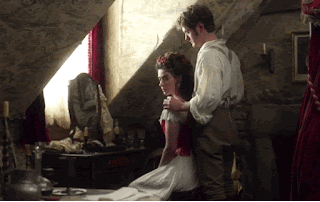
So whilst Francis is a character that might be defined as a silly childish husband on account of defining him by his gambling and cheating on Elizabeth, it is clear this was a manifestation of his marital disappointment and loneliness. The chicken and egg theory is resolved as to his vices of the drinking, gambling and cheating. Narration (as at the top at this post) addressing his sentimentalism indicates that this was his ailment and that when his expectation in Elizabeth failed -(being too much for her to fulfil as she no longer loved him), he turned to these vices.
Ross: Another with questionable symptoms of sentimentalism
Still this behaviour from Francis cannot be justified even with an understanding of why. However as with understanding there is an appreciation for an element of human nature and indications that this sentimentalism related to the Poldarks should remind the reader that the other Poldark, Ross Poldark was equally afflicted with sentimentalism too and this also led him to deplorable behaviour. He indulged in heavy drinking for years after Elizabeth's rejection of him. His sentimentalism did equally manifest itself in wild reckless and semi criminal behaviour after Julia's death in his activities on Hendrawna beach and irrationally (by Dwight's own estimation) agreeing to a duel where he killed Monk Adderly out of anger in light of his wife's infidelity. Ross and Francis had the same experience of feeling pain which manifested itself in different but equally pitiable and life endangering symptoms.
Aside from Francis's untold story of disappointment and loneliness, there is the rewritten story which takes advantage of this untold story to redefine it and is addressed in the upcoming piece 'The Rewritten Story of Francis Poldark'. However as a fully fleshed out character there is much more to Francis's character than this woeful untold story. The upcoming think pieces of 'The Real Francis Poldark' will explore his vices, financial demise along with his more admirable traits as well as 'The Redemption of Francis Poldark'.
Other Blogs Of Interest


